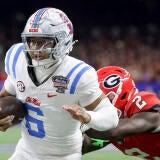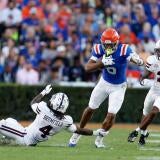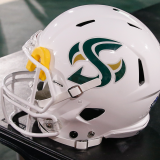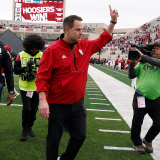How ex-Purdue offensive coordinator Graham Harrell went from hot coaching name to midseason firing
Harrell was relieved of his duties just four games into Purdue's 2024 season

Graham Harrell was once college football's next big thing. A record-shattering quarterback at Texas Tech that played in, and studied under, Mike Leach's innovative Air Raid offense, Harrell went into coaching after a brief stint at the professional level and earned his first offensive coordinator gig at just 31 years old.
But now, he's been cast out as Purdue's offensive coordinator four games into his second season with the program. He is the first Power Four coordinator to get the axe in 2024, with Purdue -- which fell to 1-3 after a Week 5 loss to Nebraska -- being his third school since 2021.
It was an understandable decision from Purdue coach Ryan Walters, who is now 5-11 through his first 16 games in West Lafayette. The Boilermakers scored 49 points in their season opener against FCS Indiana State and have since put 38 total points on the board in three straight games against FBS opponents. Their 12.7 points per game over the last three weeks rank No. 122 nationally.
Purdue failed to reach at least 100 yards rushing in two of its four games, and 18 drives ended in a three-and-out in its last three games. It ranks 15th in the Big Ten in both total offense (322 yards per game) and scoring offense (21.8 points per game).
A lot of the inefficiency is due to a passing attack -- and, again, Harrell is a Leach disciple -- that averages a paltry 172.2 yards per game. Quarterback Hudson Card has thrown at least one pick six in each of Purdue's last three games.
The numbers weren't any better in 2023, either. The Boilermakers scored at least 20 points just three times against Big Ten opponents, and their 211.2 yards passing per game was the program's lowest mark since 2014.
Walters had plenty of evidence to make the change, but it also smacks of a decision made to bail water from a sinking ship. To pin Purdue's problems on the offense alone would be disingenuous. Walters came to Purdue after two seasons as the defensive coordinator at Illinois. The Boilermakers currently field the Big Ten's worst defense, ranking dead last in the conference in scoring (33 ppg), total defense (399 ypg) and rush defense (242 ypg).
Purdue is the only program in the nation without a single forced turnover all year yet is distinctly undisciplined with an FBS-worst 92 penalty yards per game. Harrell's offense was ineffective, yes, but Purdue has systemic problems that go much deeper than one assistant coach.
That's a common refrain throughout Harrell's career. In 2019, USC hired Harrell, fresh off leading consecutive top-30 offenses at North Texas, in part to try to help right the tailspin that the Trojans were taking under former coach Clay Helton.
It worked. USC improved its win total from 5-7 to 8-5, and went from 4-5 in Pac-12 play to 7-2. Harrell's offense averaged 454 yards 32.5 points per game, and quarterback Kedon Slovis was named the 2019 Pac-12 Freshman of the Year.
Harrell fielded interest from other college programs, including Tom Herman's Texas Longhorns, and even the NFL's Philadelphia Eagles, but USC gave him a big raise to stick around Los Angeles. In a COVID-shortened 2020 season, the Trojans went 5-1 while averaging 33.3 points per game, returned to the Pac-12 Championship Game for the first time since 2017 and finished the year ranked No. 21 in the AP Top 25.
That's when the wheels fell off. Helton was fired two games into the 2021 season after a loss to Stanford, and amid all the turmoil, Harrell's offense took a nosedive. He wasn't retained when Lincoln Riley came to Los Angeles and brought an entirely new philosophy with him.
Harrell landed on his feet as the offensive coordinator at West Virginia, working under another coach under tremendous pressure in Neal Brown, who had two losing seasons in his first three years leading the Mountaineers.
There was no miracle turnaround. West Virginia lost seven games for the third time in four years and matched its worst conference showing under Brown with a 3-6 record in Big 12 play. Harrell's offense did average a respectable 412.6 yards per game, but it struggled to finish drives in the red zone and fielded one of the Big 12's worst rushing attacks, finishing eighth in the conference with 135.1 yards on the ground on average.
So Harrell left -- not necessarily fired, but not necessarily welcomed back -- to join Walters' inaugural staff at Purdue. He lasted 16 games.
At just 39 years old, Harrell should still have a lengthy career ahead of him. But a string of tough gigs and circumstances beyond his control have a once promising future in question.


















